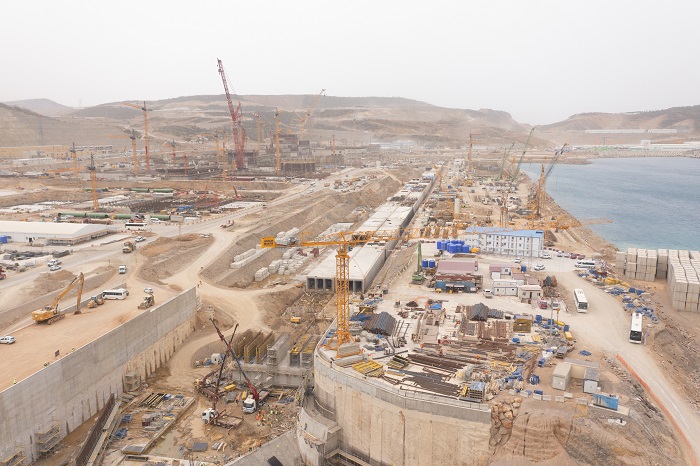
As part of the work on establishing a unified water discharge system at the construction site of Akkuyu NPP Unit 1, construction workers connected the discharge channel and the siphon well, according to Rosatom. The facilities will ensure the removal of sea water and desalinated water to be used for cooling the nuclear power plant equipment.
Establishing of a water discharge system is an important stage in the construction of the high-tech onshore hydraulic structures of Akkuyu NPP. The construction of discharge channels and siphon wells is carried out in parallel for Akkuyu NPP Units 1 and 2. Construction of these facilities involve 700 workers and experts who work in shifts continuously.
Water flows are mixed and temperature of the water coming from condenser and other NPP cooling systems is balanced in the siphon well prior to being discharged into the outlet channel. The builders will pour 17,600 cubic meters of concrete into the reinforced concrete structures of the siphon well. During the construction of the water discharge channel, more than 40,000 cubic meters of concrete will be used.
The channel of about 950 meters long is being constructed along the coastline of the site. It consists of 34 separate sections connected by special expansion joints, which make the channel resistant to such external impacts as air temperature changes, seismic events and soil settlement.
AKKUYU NUCLEAR JSC CEO Anastasia Zoteeva said: “The complex of high-tech coastal facilities of Akkuyu NPP is a unique engineering facility designed by Turkish and Russian specialists. The construction of the onshore facilities is one of the key stages in the preparation of Akkuyu NPP for commissioning. They will provide the NPP with water necessary for cooling thermal and mechanical equipment. It should be noted that seawater is not used for cooling the reactor directly. The seawater will enter the turbine condensers to cool the steam in the secondary circuit without being exposed to radiation. We highly appreciate the work of our builders who have completed another important stage in the establishment of the future nuclear power plant’s water discharge system. Many thanks for their professionalism and excellent work!”
Before the construction of the coastal facilities, the builders performed a large amount of work on the engineering preparation of the area and reinforcing the coastline. After strengthening the soil, the construction of the siphon wells and outlet channels began. At the next stage construction workers will start the installation of tunnels and pipelines.
The complex of the marine hydraulic structures was designed to cool the main equipment of Akkuyu NPP with seawater. As part of the complex, a water intake facility with a total capacity of 334 cubic meters per second will be built. It will consist of 9 concrete supply channels and a water intake basin. After being used in the plant cooling system, water will be returned to the sea through 10 lines of the prefabricated fiberglass pipes with a diameter of 2 to 4 m and a total length of 10 km. A two-circuit system is used in modern nuclear power plants with VVER-1200 reactors. The primary circuit, in which water circulates from the reactor, is closed. Water circulates in it with the help of pumps. The heat from the primary circuit is transferred to the water of the secondary circuit, which boils, turns into steam and rotates the turbine. After leaving the turbine, steam enters the condenser, where it is again converted into liquid. Water from the primary circuit does not come into contact with the water of the secondary circuit, which makes the radioactive contamination of water discharged into the sea not possible. All NPP structures are designed to withstand any extreme external impacts, including earthquakes with a magnitude of up to 9 points.



